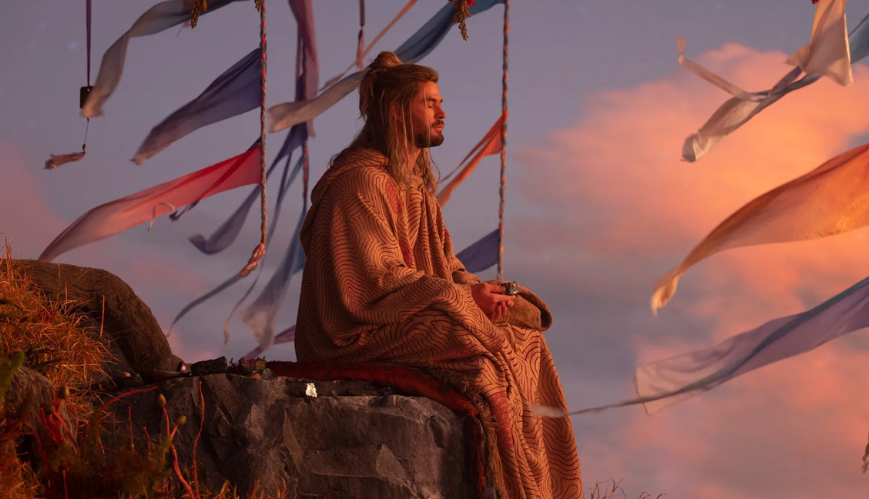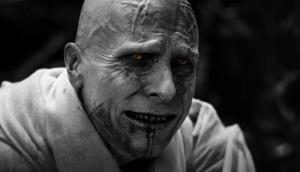Losing my religion

Losing my religion
16 September 2022
In Thor: Love and Thunder, superhero Thor must grapple with the purpose of his life after he loses everything. After experiencing deep depression, alcoholism and grief, he characterises what choosing faith looks like in times of trial. Photo courtesy of Marvel Studios. ©Marvel Studios 2022. All Rights Reserved.
I pray for my children each night. Before I go to bed, I step quietly into the darkness, straighten their blankets over them, and sit their soft toys back into the nooks of their arms. While I do so, I whisper little prayers of protection over them, repeating phrases I’ve uttered hundreds of times. I listen to them breathe, watch to see if they stir, and my mind wanders, scrolling through all the fates and misfortunes that befall people every day in the world. I say ‘amen’, then leave.
 The character of Gorr represents what we become when we lose our hope and faith and seek vengeance, as he did when he lost his daughter. Photo courtesy of Marvel Studios. ©Marvel Studios 2022. All Rights Reserved.
The character of Gorr represents what we become when we lose our hope and faith and seek vengeance, as he did when he lost his daughter. Photo courtesy of Marvel Studios. ©Marvel Studios 2022. All Rights Reserved.
It is a parent’s ritual, more routine than faith. I don’t presume life will go according to plan for myself or my children. They mean everything to me, but I don’t know what life holds. None of us do. Regardless of what we do or believe, we might lose something important in our lives. We might lose everything.
Taika Waititi’s Thor: Love and Thunder opens on a barren desert world, where an alien prophet named Gorr, played by Christian Bale, searches for water. Wandering in the wasteland, he bows in the dust and prays for the protection of his daughter, but the girl soon dies in his arms. Gorr journeys further across the desert and confronts his deity, the capricious being Rapu. The careless god dismisses Gorr’s grief, so the grieving father claims a dark, powered sword and kills Rapu out of hatred. Having lost his faith, Gorr swears revenge, vowing to kill all the god-like beings in the Marvel universe.
While the plot continuities of superhero films can become increasingly obtuse, the film’s opening makes a striking point about choice and circumstance and asks what we become if life doesn’t go according to plan. What happens to our faith, to us, if we lose everything?
Thor: Love and Thunder is a film that doesn’t really go according to plan. The superhero Thor, the cocky god of Norse myth, played by Chris Hemsworth, is grieving the loss of his family. Earth scientist Jane Foster, played by Natalie Portman, is facing a diagnosis of stage-four cancer.
Thor and Jane are reunited after a failed relationship and must travel across the universe to stop Gorr, but they can’t stop the loss they face. Grief, cancer, crisis ... these aren’t the usual character arcs for gods and love interests in superhero films. Nonetheless, along the way, the characters must choose how to respond to the misfortune and mortality they face, choosing what they will become and what they will put faith in.
In an increasingly secular society, superhero mythologies can become religious in tone, and in exploring how faith is shaped by loss, Thor: Love and Thunder is almost theology. There is a teaching in the Sermon on the Mount (Matthew 5:43-45) where Jesus also reflects on choice and circumstance and how we react to the things that may happen to us in life:
“You have heard that it was said, ‘Love your neighbour and hate your enemy.’ But I tell you, love your enemies and pray for those who persecute you, that you may be children of your Father in heaven. He causes his sun to rise on the evil and the good, and sends rain on the righteous and the unrighteous.”
This passage explores persecution and suffering but doesn’t promise divine protection. While Jesus describes God as compassionate (Matthew 7:7-8), he also observes that good and bad things happen to good and bad people. Jesus doesn’t promise safety for those with faith but instead invites us to consider how our faith reacts in a world where many respond to hurt with hate, where we can lose ourselves when we lose something important. There is much we can’t control, but as Jesus teaches, we can always choose love.
We all have moments when we step into the dark, our minds wandering through the loss in the world. We can all find ourselves in the desert with nothing but prayer when we’ve lost something important. Relationships. Loved ones. Our health. Our stories don’t always go according to plan, with our own plot twists of luck and loss, sunshine and rain, love and thunder.
Life can be good or bad, for the good or bad, and while we can lose our religion if it seeks protection in belief, we can find our faith in the loving values we choose.